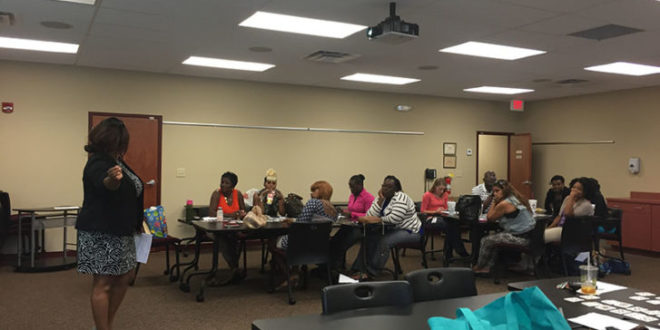More peer recovery specialists will be available for underserved areas as JU’s School of Applied Health Sciences and Nathan M. Bisk Center for Professional Studies enhance a pioneering training program with a major $447,150 subcontract awarded through a federal grant to LSF Health Systems
LSF Health Systems, Managing Entity for the Northeast and North Central Florida region, received the overall four-year grant totaling $1,148,296 through the Behavioral Health Workforce Education and Training program of the Health Resources and Services Administration.

The funds were awarded by the HRSA, an agency of the U.S. Department of Health and Human Services that works to upgrade health care to those who are geographically isolated, economically challenged or medically vulnerable.
In collaboration with JU, the Certified Recovery Peer Specialist training program, the first of its kind in Florida, is now funded for up to 70 more individuals per year, and the leading-edge program will be studied for use in other communities.
The new grant is a major expansion and enhancement of LSF Health Systems’ pilot Recovery Peer Specialist training partnership with JU that began in the fall of 2016 with a $141,000 grant. The new program will use a two-phase hybrid curriculum that includes face-to-face trainings and online hybrid courses. These courses will be designed with LSF and implemented by JU faculty and adjuncts. JU is also responsible for the comprehensive evaluation of this training program.
Participants will help in rural and medically underserved areas in Northeast and North Central Florida as Certified Recovery Peer Specialists. Northeast Florida has a shortage of these paraprofessionals, who draw on their training, preparation and lived experience to help others with substance abuse or mental health problems.
Dr. Sharon Wilburn, Chair of the Clinical Mental Health Counseling Department in the Brooks Rehabilitation College of Healthcare Sciences’ School of Applied Health Sciences, said evaluation results support that the earlier project was well-received, and that the training was effective in preparing recovery peer specialists.
“We remain excited about this new project to both continue to enhance the training for recovery peer specialists and to demonstrate longer-term effectiveness and sustainability,” she said. “This model will also allow for feedback on transportability of this type of program to other communities.”
The CRPS designation demonstrates competency in peer-to-peer recovery support and introduces paraprofessionals to a recovery-oriented and multicultural perspective on behavioral health care. Focus is placed on imparting skills and competencies to work with children, adolescents and transitional-age youth at risk of mental illness, substance abuse or suicide.
Certified Peer Specialists are key members of a recovery-oriented, interdisciplinary treatment team, added LSF Health Systems CEO Dr. Christine Cauffield.
“This grant provides a unique opportunity for us to enhance the state of Florida’s Recovery Oriented System of Care priority of effort by developing the workforce necessary to deliver Recovery Oriented Peer services in underserved areas throughout our 23-county region,” Cauffield said. “We are excited about the continued partnership with HRSA and Jacksonville University and look forward to the enhanced training program to better serve the needs of our region.”
 Wave Magazine Online Jacksonville University News Hub
Wave Magazine Online Jacksonville University News Hub
